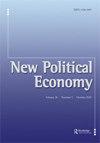制度超级周期:一种进化的宏观金融方法
IF 3.8
2区 经济学
Q1 ECONOMICS
引用次数: 13
摘要
摘要:我们基于明斯基的“阻挠机制”和“超级周期”概念,建立了一个分析宏观金融、制度和政治过程之间动态进化相互作用的框架。预警机制是旨在稳定宏观金融体系的制度结构。这些结构的有效性随着时间的推移而变化,这是追求利润的创新和长期不稳定过程的结果。受政治和意识形态冲突的影响,新的体制结构应运而生。这在资本主义中产生了一种长期的周期模式,即“超级周期”,其持续时间比标准的商业和金融周期更长。为了说明这一点,我们开发了一个宏观金融稳定指数,用于识别战后七国集团国家的两个超级周期。我们称之为工业资本主义超级周期和金融全球化超级周期。对于每一种情况,我们都根据稳定宏观金融体系的机构、习俗和政治结构的有效性,采用四阶段分类体系。超级周期框架可用于解释和预测宏观金融和政治发展,并超越将这些发展视为外生冲击的方法。本文章由计算机程序翻译,如有差异,请以英文原文为准。
Institutional supercycles: an evolutionary macro-finance approach
ABSTRACT We build upon the Minskyan concepts of ‘thwarting mechanisms’ and ‘supercycles’ to develop a framework for analysing the dynamic evolutionary interactions between macrofinancial, institutional and political processes. Thwarting mechanisms are institutional structures that aim to stabilise the macrofinancial system. The effectiveness of these structures changes over time as a result of profit-seeking innovations and long-run destabilising processes. New institutional structures emerge in response, influenced by political and ideological conflicts. This generates a secular cyclical pattern in capitalism, the ‘supercycle’, with a longer duration than standard business and financial cycles. To illustrate this, we develop a macrofinancial stability index which we use to identify two supercycles in the G7 countries in the post-war period. We label these the industrial capitalism supercycle and the financial globalisation supercycle. For each, we apply a four-phase classification system, based on the effectiveness of institutions, customs and political structures for stabilising the macrofinancial system. The supercycles framework can be used to explain and anticipate macro financial and thus political developments, and moves beyond approaches in which these developments are treated as exogenous shocks.
求助全文
通过发布文献求助,成功后即可免费获取论文全文。
去求助
来源期刊

New Political Economy
Multiple-
CiteScore
10.10
自引率
9.50%
发文量
41
期刊介绍:
New Political Economy aims to create a forum for work which combines the breadth of vision which characterised the classical political economy of the nineteenth century with the analytical advances of twentieth century social science. It seeks to represent the terrain of political economy scholarship across different disciplines, emphasising original and innovative work which explores new approaches and methodologies, and addresses core debates and issues of historical and contemporary relevance.
 求助内容:
求助内容: 应助结果提醒方式:
应助结果提醒方式:


